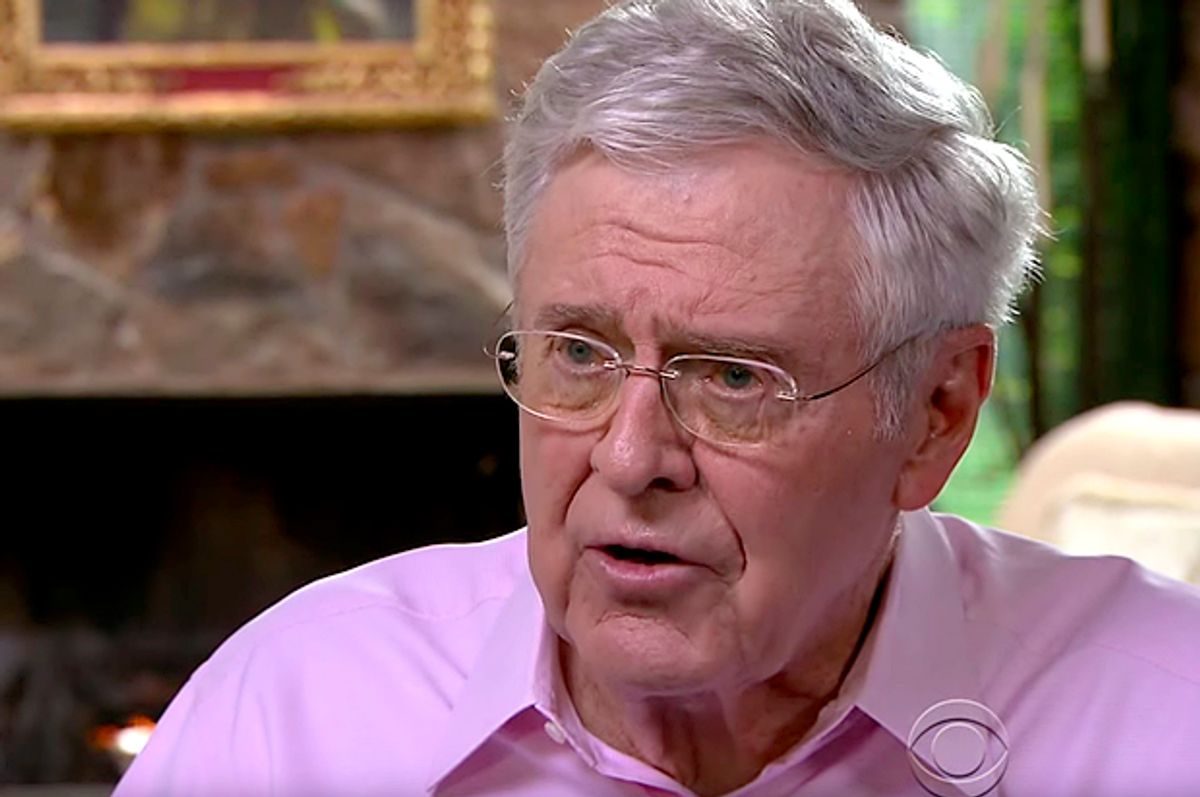I’m a big fan of irony, which is why I enjoyed this Wall Street Journal profile of Charles Koch so much. In an interview with Patrick O’Connor, Charles – evidently the more diplomatic half of the two most politically active Koch brothers – spoke somberly about the tone of the 2016 presidential race and of political discourse more generally. “It’s mainly about personalities and ‘your mother sucked rotten eggs,’” he lamented to O’Connor.
On the one hand, I understand Charles’s frustration. After all, he and his brother are looking to invest $750 million on this election. When a man, his brother, and 450 wealthy donors build a national network of umbrella organizations in order to dictate political outcomes via dark money, they expect to get the results they want.
Here’s the problem: The Koch brothers, whether they know it or not, got exactly what they paid for. If the tone of our politics has sunk to Cro-Magnon levels, it’s because the process has been flooded with money and propaganda and rabid right-wingers who’ve coarsened the discourse and made compromise impossible.
Everything about our politics took a dark turn around the time of Obama’s election in 2008, which is precisely when the Koch brothers’ political machine exploded into being. As O’Connor writes:
In 2003, Mr. Koch convened about a dozen like-minded conservatives in Chicago with the goal of becoming more overtly political. Those efforts took hold early in Barack Obama’s presidency amid voter unease with the bank bailout signed by President George W. Bush and with the passage of the Affordable Care Act. Groups financed by the Kochs and their alliance spent more than $400 million in 2012…In that year’s presidential election, Americans for Prosperity and two other Koch-financed groups spent a total of more than $50 million on television ads.
The “lack of substance and civility” about which Charles complains began in earnest with the rise of the Tea Party between 2009 and 2010. To the extent that the Tea Party is a centralized movement, it is so because it has been mobilized by the groups Americans for Prosperity and Freedom Works, both of which are Koch-financed. As it happens, these groups were formerly a single organization, called Citizens for a Sound Economy, which was founded in 1984 by, you guessed it, the Koch Brothers.
The Tea Party, from the very beginning, was designed for disruption, and it was a pet project of the Koch brothers (they actually created the first national website for the movement). Charles Koch says he’s interested only in advancing “free-market, small-government ideals,” but what he’s done is manufacture a faux-populist movement that has whipped the conservative base into an anti-government frenzy.
In the process of serving his narrow and self-interested ideological ends, he allowed the worst elements of the conservative movement – the xenophobes, the nationalists, and the theocrats – to hijack the Republican Party. Initially this worked, because it sent obstructionists to Congress whose only mission was to shut the government down. But, over time, it’s created a political climate in which it’s nearly impossible to govern. And it’s prepared the way for someone like Donald Trump (whose campaign manager, Corey Lewandowski, is a product of Americans for Prosperity), who exists only because he’s been able to tap into the sentiments let loose by the Tea Party movement.
Hence the incredible irony of a Charles Koch bemoaning what’s become of our political process, a process he, as much as anyone, helped engineer.


Shares